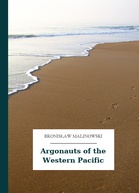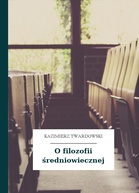Argonauts of the Western Pacific - Bronisław Malinowski (darmowa biblioteka online .TXT) 📖

Argonauts of the Western Pacific to rozprawa naukowa autorstwa Bronisława Malinowskiego. Jest ona efektem wyprawy badacza na wyspy Toulon i wyspy Trobriandzkie.
Malinowski opisuje w niej przede wszystkim rytuał Kula, ukazujący zdolności handlowe ludów tam żyjących. Rytuał polega na wymianie biżuterii, opierającej się na pewnych szytwno ustalonych regułach związanych m.in. z równą wartością wymienianych przedmiotów. Malinowski upatruje w przedstawicielach społeczeństw pierwotnych wcielenia Argonautów z mitologii greckiej, którzy udali się po Złote Runo. Rozprawa Malinowskiego została oparta na wynikach jego metody badań antropologicznych — metody uczestniczącej, a nie wyłącznie obserwacyjnej. Jego działalność była przełomowa dla antropologii, która do tej pory bazowała na prowadzeniu obserwacji, a także rozszerzaniu założeń na kolejne wyniki badań.
Bronisław Malinowski był polskim antropologiem i socjologiem publikującym w pierwszej połowie XIX wieku. Prowadził badania społeczeństw pierwotnych w różnych zakątkach świata.
- Autor: Bronisław Malinowski
- Epoka: Współczesność
- Rodzaj: Epika
Czytasz książkę online - «Argonauts of the Western Pacific - Bronisław Malinowski (darmowa biblioteka online .TXT) 📖». Wszystkie książki tego autora 👉 Bronisław Malinowski
The study of Ethnology — so often mistaken by its very votaries for an idle hunting after curios, for a ramble among the savage and fantastic shapes of „barbarous customs and crude superstitions” — might become one of the most deeply philosophic, enlightening and elevating disciplines of scientific research. Alas! the time is short for Ethnology, and will this truth of its real meaning and importance dawn before it is too late?
1. treatise on the family among the aborigines of Australia — The Family among the Australian Aborigines: A Sociological Study. London University of London Press, 1913. [przypis edytorski]
2. account of the natives of Mailu in New Guinea — The Natives of Mailu Preliminary Results of the Robert Mond Research Work in British New Guinea. „Transactions of the Royal Society of South Australia”, vol. xxxix., 1915. [przypis edytorski]
3. The hiri, as these expeditions are called in Motuan, have been described with a great wealth of detail and clearness of outline by Captain F. Barton, in C. G. Seligman’s The Melanesians of British New Guinea, Cambridge, 1910, Chapter VIII. [przypis autorski]
4. Cf. The Mailu, by B. Malinowski, in „Transactions of the R. Society f S. Australia”, 1915; Chapter iv. 4, pp. 612 to 629. [przypis autorski]
5. Op. cit. Chapter XI. [przypis autorski]
6. On this point of method again, we are indebted to the Cambridge School of Anthropology for having introduced the really scientific way of dealing with he question. More especially in the writings of Haddon, Rivers and Seligman, he distinction between inference and observation is always clearly drawn, and we can visualise with perfect precision the conditions under which the work was done. [przypis autorski]
7. I may note at once that there were a few delightful exceptions to that, to mention only my friends Billy Hancock in the Trobriands; M. Raffael Brudo, another pearl trader; and the missionary, Mr. M. K. Gilmour. [przypis autorski]
8. According to a useful habit of the terminology of science, I use the word Ethnography for the empirical and descriptive results of the science of Man, and the word Ethnology for speculative and comparative theories [przypis autorski]
9. The legendary „early authority” who found the natives only beastly nd without customs is left behind by a modern writer, who, speaking about he Southern Massim with whom he lived and worked „in close contact” for any years, says „ ...We teach lawless men to become obedient, inhuman men to love, and savage men to change”. And again: „Guided in his conduct by nothing but his instincts and propensities, and governed by his unchecked passions...” „Lawless, inhuman and savage!” A grosser misstatement of the real state of things could not be invented by anyone wishing to parody the Missionary point of view. Quoted from the Rev. C. W. Abel, of the London Missionary Society, Savage Life in New Guinea, no date. [przypis autorski]
10. For instance, the tables of circulation of the valuable axe blades, op. cit. pp. 531, 532. [przypis autorski]
11. In this book, besides the adjoining Table, which does not strictly belong to the class of document of which I speak here, the reader will find only a few samples of synoptic tables, such as the list of Kula partners mentioned and analysed in Chapter XIII, Division II, the list of gifts and presents in Chapter VI, Division VI, not tabularised, only described; the synoptic data of a Kula expedition in Chapter XVI, and the table of Kula magic given in Chapter XVII. Here, I have not wanted to overload the account with charts, etc., preferring to reserve them till the full publication of my material. [przypis autorski]
12. qua (from Latin) — as. [przypis edytorski]
13. verbatim (Latin) — literally, word by word. [przypis edytorski]
14. termini technici (Latin) — technical terms. [przypis edytorski]
15. It was soon after I had adopted this course that I received a letter from Dr. A. H. Gardiner, the well-known Egyptologist, urging me to do this very hing. From his point of view as archaeologist, he naturally saw the enormous possibilities for an Ethnographer of obtaining a similar body of written sources as have been preserved to us from ancient cultures, plus the possibility of illuminating them by personal knowledge of the full life of that culture. [przypis autorski]
16. scholia (Latin) — glosses, notes. [przypis edytorski]
17. The best accounts we possess of the inland tribes are those of W. H. Williamson, The Mafulu, 1912, and of C. Keysser, Aus dem Leben der Kaileute, in R. Neuhauss, Deutsch Neu Guinea, Vol. III. Berlin, 1911. The preliminary publications of G. Landtmann on the Kiwai, Papuan magic n the Building of Houses, „Acta Arboenses”, Humaniora. I. Abo, 1920, and The Folk-Tales of the Kiwai Papuans, Helsmgfors, 1917, promise that he full account will dispel some of the mysteries surrounding the Gulf of Papua. Meanwhile a good semi-popular account of these natives is to be found n W. N. Beaver’s Unexplored New Guinea, 1920. Personally I doubt ery much whether the hill tribes and the swamp tribes belong to the same stock or have the same culture. Compare also the most recent contribution to his problem Migrations of Cultures in British New Guinea, by A. C. Haddon, Huxley Memorial Lecture for 1921, published by the R. Anthrop Institute. [przypis autorski]
18. See C. G. Seligman, The Melanesians of British New Guinea, Cambridge, 1910. [przypis autorski]
19. Cf. C. G. Seligman, op. cit., p. 5. [przypis autorski]
20. A number of good portraits of the S. Massim type are to be found in he valuable book ot the Rev. H. Newton, In Far New Guinea, 1914 and in he amusingly written though superficial and often unreliable booklet of the Rev. C. W. Abel (London Missionary Society), Savage Life in New Guinea (No date). [przypis autorski]
21. ipso facto (Latin) — by the very same act. [przypis edytorski]
22. See Table in the Introduction, and also Chapters XVI and XX. [przypis autorski]
23. Cf. Professor C. G. Seligman, op. cit., Chapters XL and XLII. [przypis autorski]
24. Professor C G. Seligman, op. cit., Chapters XXXV, XXXVI, XXXVII. [przypis autorski]
25. Cf. Professor C. G. Seligman, Chapters XXXVII and XXXVIII. [przypis autorski]
26. My knowledge of the Dobuans is fragmentary, derived from three short visits in their district, from conversation with several Dobu natives whom I had in my service, and from frequent parallels and allusions about Dobuan customs, which are met when doing field-work among the Southern Trobrianders. There is a short, sketchy account of certain of their customs and beliefs by the Rev. W. E. Bromilow, first missionary in Dobu, which I have also consulted, in the records of the Australasian Association for the Advancement of Science. [przypis autorski]
27. Professor C. G. Seligman, op. cit., pp. 170 and 171; 187 and 188 about the Koita and Motu; and B. Malinowski, The Mailu, pp. 647–652. [przypis autorski]
28. Comp. D. Jenness and A. Ballantyne, The Northern d’Entrecasteaux, Oxford, 1920, Chapter XII. [przypis autorski]
29. I spent about a month in these islands, and found the natives surprisingly intractable and difficult to work with ethnographically. The Amphlett „boys” are renowned as boys good boat-hands, but in general they are not such capable and willing workers as the Dobuans. [przypis autorski]
30. Already Dr. C. G. Seligman has noticed that there are people of an outstanding fine physical type among the Northern Massim, of whom the Trobrianders form the Western section, people who are „generally taller (often very notably so) than the individuals of the short-faced, broad-nosed type, in whom the bridge of the nose is very low”. Op. cit., p. 8. [przypis autorski]
31. I have dealt with the subject of garden work in the Trobriands and ith its economic importance more fully in an article entitled The Primitive Economics of the Trobriand Islanders in „The Economic Journal”, March, 1921. [przypis autorski]
32. This does not mean that the general economic conclusions are wrong. The economic nature of Man is as a rule illustrated on imaginary savages for didactic purposes only, and the conclusions of the authors are in reality based n their study of the facts of developed economics. But, nevertheless, quite apart from the fact that pedagogically it is a wrong principle to make matters look more simple by introducing a falsehood, it is the Ethnographer’s duty and right to protest against the introduction from outside of false facts into his own field of study. [przypis autorski]
33. primus inter pares (Latin) — the first among the equals. [przypis edytorski]
34. Compare Professor C. G. Seligman, op. cit., pp. 663–668; also the Author, Article on War and Weapons among the Trobriand Islanders, in Man, January, 1918. [przypis autorski]
35. Compare the Author’s article on Fishing and Fishing Magic in the Trobriands, Man, June, 1918. [przypis autorski]
36. The discovery of the existence of „linked” totems, and the introduction of this term and conception are due to Professor C. G. Seligman. Op. tit. , pp. 9, 1 1; see also Index. [przypis autorski]
37. See the Author’s article, Baloma, Spirits of the Dead, Part VII, J. R. A. I., 1917, where this statement has been substantiated with abundant vidence. Further information obtained during another expedition to the Trobriands, established by an additional wealth of detail the complete ignorance f physiological fatherhood. [przypis autorski]
38. See the Author’s article Baloma, Spirits of the Dead, quoted above. [przypis autorski]
39. I am using the words religion and magic according to Sir James Frazer’s distinction (see Golden Bough, vol. I). Frazer’s definition suits the Kiriwinian facts much better than any other one. In fact, although I started my field work convinced that the theories of religion and magic expounded in the Golden Bough are inadequate, I was forced by all my observations in New Guinea to come over to Frazer’s position. [przypis autorski]
40. Compare Professor C. G. Seligman, op. cit., the parallel description of he social institutions in the Trobriands, Marshall Bennetts, Woodlark Island nd the Loughlands, Chapters XLIX–LV. [przypis autorski]
41. By „current view”, I mean such as is to be found in text-books and n passing remarks, scattered through economic and ethnological literature. As a matter of fact, Economics is a subject very seldom touched upon either in theoretical works on Ethnology, or in accounts of field-work. I have enlarged n this deficiency in the article on Primitive Economics, published in the „Economic Journal”, March, 1921. The best analysis of the problem of savage economy is to be found, in spite of its many shortcomings, in K. Bűcher’s Industrial Evolution, English Translation, 1901. On primitive trade, however, his views are inadequate. In accordance with his general view that savages have no national economy, he maintains that



Uwagi (0)